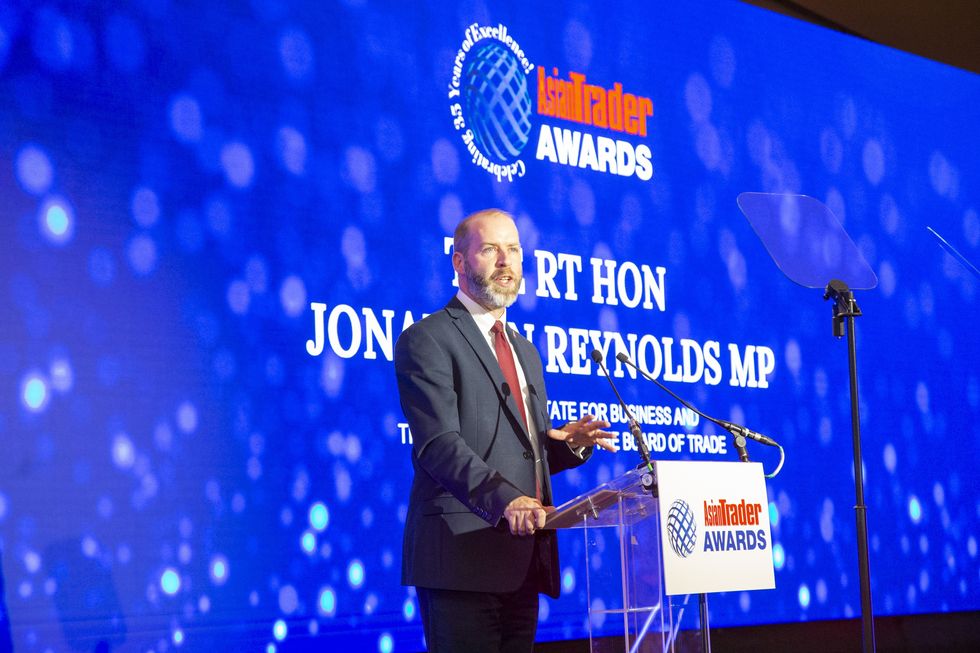Bedford retailer Kashif Jaffar has won the Convenience Chain of the Year award at the 2024 Asian Trader Awards ceremony held on 5 November at London's Park Plaza Westminster Bridge hotel.
Jaffar is a serial retail entrepreneur who has built a highly successful chain of convenience stores across the south-east of England.
He started out with a single store in 1994 and gradually built a chain of stores. Jaffar believes that multiple stores enables him to manage costs more effectively and strike better deals. Most important of all though, he says, is the team, who he empowers to take ownership of the stores and drive sales and profit through enthusiastic and sincere customer service.
Jaffar built a chain of 13 stores before selling seven to the Co-op. His remaining tally of eight operates under the Welcome banner of Southern Co-Op. He runs the business with his brother and they also run Costa and Pizza Hut franchises, which they say is the perfect balance, allowing them to devote their attention to ambience and merchandising detail, such as outstanding displays at the entrance and enticing impulse baskets by the checkouts.

Business secretary Jonathan Reynolds attended as chief guest at the ceremony, which celebrated excellence in convenience retail across the UK. The event marked its 35th anniversary this year, continuing its tradition of recognising outstanding achievements in the sector.
Speaking at the event, Shefali Solanki-Nair, associate publisher of Asian Trader, highlighted the crucial role of convenience retailers in local communities, amidst the many challenges facing the sector.
“With rising energy costs, inflation, and changes in taxation, many retailers are feeling the pinch more than ever. It’s a tough environment for convenience retailers who are already working with narrow margins while striving to offer exceptional service and products,” she said.
“These challenges are daunting, but the ability to adapt and innovate speaks volumes about retailer’s character and dedication.”

Noted impressionist Rory Bremner hosted the event, which also saw 15 other retailers being honoured in different categories, including Shaan and Arshan Chaudry of Costcutter, Triple A Foodstore in Nuneaton, who won the top prize, Asian Trader of the Year.
Bestway Sher Depot, Kilbirnie Street, Glasgow won the Wholesale Depot of the Year award. Six new product launches from the last year, voted for by the retailers, were also feted.
Ramniklal Solanki Editor’s Award, instituted in the memory of Ramniklal Solanki CBE, founder of Asian Media Group, went to the sub postmasters and mistresses caught up in the Post Office Horizon scandal. Seema Misra and Vijay Parekh collected the award, representing them.
The event also raised funds for Lepra, a charity that support people affected by leprosy.

Winners List
Ram Solanki Award For Excellence in Convenience and Wholesale: Sub postmasters and mistresses caught up in the Post Office Horizon scandal
Product and Manufacturer Awards
Snack Brand of the Year: McCoy's Epic Eats (KP Snacks)
Soft Drinks Brand of the Year: Coca Cola Lemon (CCEP)
Confectionery Brand of the Year: Cadbury Starbar Duo (Mondelez International)
Vape and Next Generation Brand of the Year: Blu Bar Pod (Imperial Brands)
Lager, Beer and Cider Brand of the Year: Birra Moretti Sale di Mare (Heineken)
Grocery Brand of the Year: McVitie’s Signature (pladis)
Asian Trader Awards 2024
Responsible Retailer of the Year supported by Imperial Brands: Priyesh Vekaria, One Stop Carlton Convenience, Salford, Manchester
Wholesale Depot of the Year supported by Tilda: Bestway Sher Depot, Kilbirnie Street, Glasgow
Convenience Chain of the Year: Kashif Jaffar, Southern Co-op Bromham Stores, Bromham, Bedford
Best smokeless alternatives Retailer of the year supported by VELO: Prashant and Trupti Patel, One Stop Brockworth in Gloucester
Bakery Retailer of the Year supported by Warburtons: Jess Read and Gary Hunt, Budgens of Holt, Norfolk
Next Gen Award: Harman Puni, HP Convenience Premier, Chesterfield
World Food Retailer Award supported by Tropical Sun: Reji Thomas & Siddique Chenganakattil, Essentials Supermarket, Bedford
Independent Retailer of the Year supported by Booker: Jenarthen Saravanamuthu, Premier Rassau Stores, Ebbw Vale, South Wales
Food to Go Retailer of the Year supported by KP Snacks: Priyesh Patel, Londis, Stoke Newington, London
Spirit of the Community Award supported by Mondelez International: Amarjit Singh Rakhra, Budgens Pomeroy Street, London
Symbol Retailer of the Year supported by Bestway: Kersheaup Vagadia, Costcutter Kearsley, Bolton
Off Licence of the Year supported by Molson Coors (Cobra): Pradeep Thangaraj, Wine Rack, Bicester, Oxford
Impulse Retailer of the Year supported by pladis: Bharat Khunti, Shivom Convenience Go Local, Nuneaton
Tobacco Retailer Award supported by JTI: Suresh Arulanantham, My Costcutter Murco, Rye, East Sussex
Local Hero Award: Nathalie Kaur, One Stop Partick Convenience Store, Glasgow
Businesswoman of the Year supported by Philip Morris Ltd: Sue Nithyanadan, Costcutter, Epsom, Surrey
Asian Trader of the Year: Shaan and Arshan Chaudry, Costcutter, Triple A Foodstore, Nuneaton, Warwickshire






